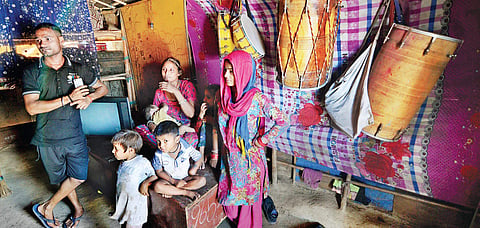

Anjana*, 13, studies in Class 7 and wants to become a singer. That’s a big dream for a girl born in a family that belongs to the Perna community — a denotified tribe (DNT) whose women have been engaged in sex work for generations. Pernas are among the dozens of DNTs in India who have been living on the margins of society, largely untouched by government’s welfare schemes for poor, backward communities even after decades of Independence.
Branded as criminals under the Criminal Tribes Act of 1871, these communities were ‘denotied’ in 1952, but still face the stigma. The law might have changed, the mindsets haven’t. Police continue to harass them.
A series of legislations followed till they were denotified, explains Vijay Raghavan, Professor, Centre for Criminology and Justice, Tata Institute of Social Sciences (TISS). “The ones which got tagged as criminal tribes were the ones which carry a greater social stigma. This was an artificial classification done by the British based on their perceived knowledge on who are criminal tribes,” he says.
The government set up a National Commission in 2005 that made several recommendations to improve the condition of these communities. But its report was put into the cold storage. Another commission was set up in 2015 and submitted its recommendations earlier this year, which are still under consideration.
Several DNT communities are living in various pockets of the national capital in abysmal conditions. In Dharampura area of Najafgarh, women of the Perna community become sex workers early in their lives. Poor literacy, lack of access to welfare schemes and other livelihood opportunities leave them with little choice.
The NGO Apne Aap is running an intervention programme in the area to provide alternative livelihoods. “We plan to achieve this by providing the younger generation with exit strategies,” says Hakim Muhammad Afzal, a fellow at Apne Aap. This has given hope to girls like Anjana, whose mother Sapna* is a sex worker but wants a “secure future” for her daughter.
The living conditions of Saperas and Singhis are even more deplorable. Sunaina, a Class 10 student, says she wants to pursue a course in nursing. But her mother Jagmanti is not optimistic of the future. The community has traditionally earned its livelihood as snake charmers or playing monkey tricks on streets, but business dried up after the Wildlife Protection Act was enacted. “If the government has banned our traditional livelihood, it should give us alternatives. Our earnings are seasonal now, with the men playing instruments at weddings,” says Jagmanti.
The Singhi community’s traditional profession, cleaning ear wax, is virtually dead, too. Now, they sell toys across cities, repair shoes and go to temples for food. “While some communities like blacksmiths, medicinal sellers were accepted, the more wild nomadic tribes were treated with hostility and that continues till today,” says sociologist Milind Bokhil. The other major issue is the lack of research and documentation on the problems faced by the communities, he adds.
The lack of enumeration of DNTs is the biggest hindrance to them being brought into the mainstream. “The denotified tribes are not separately documented in the Census. While some of the communities have been included in SC/ST/OBC categories, there are others which are not in any of the lists. Literacy rates remain poor which means they have no access to government schemes. The lack of documentation further aggravates their problems as they cannot prove which community they belong to,” says Raghavan.
For the Mahavat community in East Delhi, problems range from lack of access to water, rations, caste certificates and poor living conditions. Women engage in ragpicking while men play dhol at weddings. The state’s welfare measures are out of bounds for this community. In schools, children of these communities are often discriminated against, derided and beaten up.
Recently, TISS team Koshish has trained 30 men and five young women in driving. “It is not easy for the community to shift occupations. We aim towards a community model of rehabilitation,” says Prem, senior project officer, Koshish. Malnutrition, high substance abuse and sexual violence against women are among the other problems faced by DNTs.
The need of the hour is a strong action plan to understand the communities and improve their lot, say researchers. “It is important to understand their framework and not apply any external framework on them,” says Mayank Sinha, convener, National Alliance Group of DNTs.
*These names have been changed to protect identities.